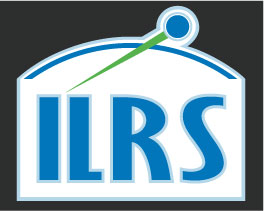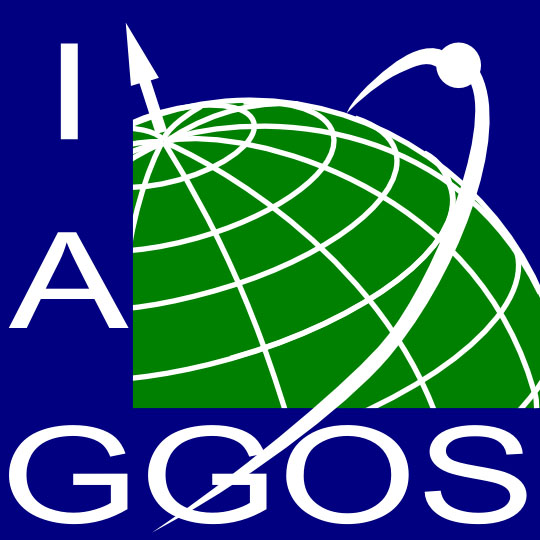
GLONASS
Jump to: Mission Objectives, Mission Instrumentation, Mission Parameters, Additional Information
Mission Photos:
| Early GLONASS | GLONASS-K | GLONASS-M |
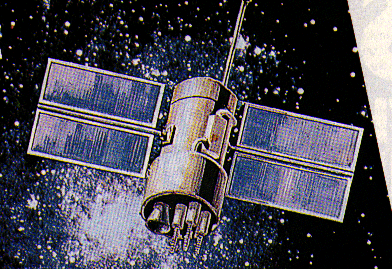 |
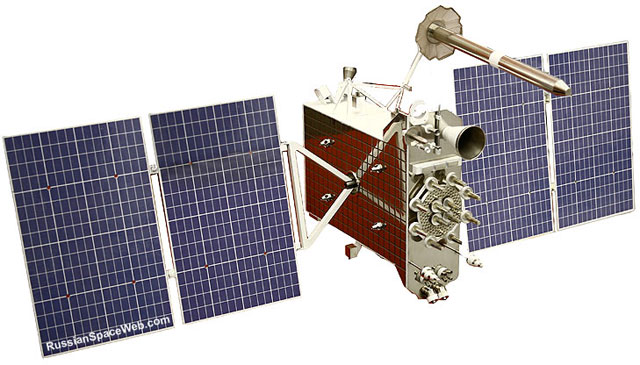 |
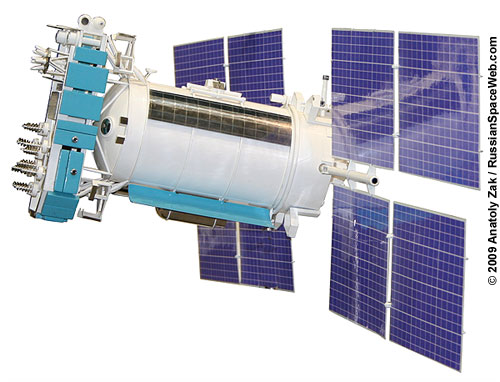 |
| Image courtesy of Russian SpaceWeb | Image courtesy of Russian SpaceWeb |
Mission Objectives:
The Global Navigation Satellite System (GLObal'naya Navigatsionnay Sputnikovaya Sistema, GLONASS), is based on a constellation of active satellites, sponsored by the Russian Federation Ministry of Defense, which continuously transmit coded signals in two frequency bands, which can be received by users anywhere on the Earth's surface to identify their position and velocity in real time. The primary application of GLONASS is positioning and time transfer. All the satellites weigh approximately 1400 kg and are in circular orbits with perigees approximately 19,000 km; with eccentricities between 0.0001 and 0.0035; with inclinations between 64.2 and 65.6 degrees; and with orbital periods of 676 minutes.
The system is a counterpart to the United States Global Positioning System (GPS) and both systems share the same principles in the data transmission and positioning methods. On 12 October 1982, the first GLONASS satellites were placed into orbit, and the experimental work with GLONASS began. Over this time span, the system was tested, and different aspects were improved, including the satellites themselves. Although the initial plans pointed to 1991 for a complete operational system, the deployment of the full constellation of satellites has been completed in late 1995, early 1996. GLONASS-1 through -61 are no longer in service.
Note: GLONASS-40 and -41 were launched with the Etalon-1 satellite. GLONASS-42 and -43 were launched with Etalon-2.
The GLONASS, like GPS, consists of three segments, the SPACE, CONTROL, and USER segments:
- The SPACE segment of GLONASS, is formed by 24 satellites located on three orbital planes. Each satellite is identified by its slot number, which defines the orbital plane (1-8, 9-16,17-24) and the location within the plane. The three orbital planes are separated 120 degrees. Within a three orbital plane, the eight satellites are separated by 45 degrees. The GLONASS orbits are circular orbits of 19,140 km, with an inclination of 64.8 degrees and a period of 11 hours 15 minutes 44 seconds.
- The CONTROL segment of GLONASS is entirely located in former Soviet Union territory. The Ground Control Center and Time Standards is located in Moscow and the telemetry and tracking stations is located in St. Petersburg, Ternopol, Eniseisk, Komsomolsk-na-Amure.
- The USER segment consists of antennas and receiver-processors that provide positioning, velocity and precise timing to the user.
The expected life of each GLONASS satellite is 3 to 5 years.
Mission Instrumentation:
GLONASS satellites have the following instrumentation onboard:
- Solar array
- 12 primary antennas for L-band transmissions
- Cesium atomic clock
- Retroreflector array
Mission Parameters:
| Western GLONASS Number |
Russian GLONASS Number |
Kosmos Number |
COSPAR ID |
ILRS Satellite ID |
ILRS SIC |
Satellite Catalog (NORAD) Number |
Orbit Plane |
Freq. Channel |
Slot |
Launch Date |
Date Withdrawn |
Type M? |
|---|---|---|---|---|---|---|---|---|---|---|---|---|
| 40 | 1987 | 1989-001A | 8900101 | 6666 | 19749 | 10-Jan-89 | ||||||
| 41 | 1988 | 1989-001B | 8900102 | 7777 | 19750 | 10-Jan-89 | ||||||
| 44 | 2079 | 1990-045A | 9004501 | 1111 | 20619 | 19-May-90 | ||||||
| 47 | 2109 | 1990-110A | 9011001 | 2222 | 21006 | 8-Dec-90 | ||||||
| 49 | 249 | 2111 | 1990-110C | 9011003 | 9049 | 21008 | 8-Dec-90 | 15-Aug-96 | ||||
| 50 | 750 | 2139 | 1991-025A | 9102501 | 3333 | 21216 | 4-Apr-91 | 14-Nov-94 | ||||
| 51 | 753 | 2140 | 1991-025B | 9102502 | 4444 | 21217 | 4-Apr-91 | 4-Jun-93 | ||||
| 52 | 754 | 2141 | 1991-025C | 9102503 | 9052 | 21218 | 4-Apr-91 | 16-Jun-92 | ||||
| 53 | 768 | 2177 | 1992-005A | 9200501 | 9053 | 21853 | 29-Jan-92 | 29-Jun-93 | ||||
| 54 | 769 | 2178 | 1992-005B | 9200502 | 9054 | 21854 | 29-Jan-92 | 25-Jun-97 | ||||
| 55 | 771 | 2179 | 1992-005C | 9200503 | 9055 | 21855 | 29-Jan-92 | 21-Dec-96 | ||||
| 56 | 774 | 2206 (2204) |
1992-047A | 9204701 | 9056 | 22056 | 30-Jul-92 | 26-Aug-96 | ||||
| 57 | 756 | 2204 (2205) |
1992-047B | 9204702 | 9057 | 22057 | 30-Jul-92 | 4-Aug-97 | ||||
| 58 | 772 | 2205 (2206) |
1992-047C | 9204703 | 9058 | 22058 | 30-Jul-92 | 27-Aug-94 | ||||
| 59 | 773 | 2234 | 1993-010A | 9301001 | 9059 | 22512 | 17-Feb-93 | 17-Aug-94 | ||||
| 60 | 757 | 2236 (2235) |
1993-010B | 9301002 | 9060 | 22513 | 17-Feb-93 | 23-Aug-97 | ||||
| 61 | 759 | 2235 (2236) |
1993-010C | 9301003 | 9061 | 22514 | 17-Feb-93 | 4-Aug-97 | ||||
| 62 | 760 | 2276 (2275) |
1994-021A | 9402101 | 9062 | 23043 | 3 | 24 | 17 | 11-Apr-94 | 9-Sep-99 | |
| 63 | 761 | 2277 (2276) |
1994-021B | 9402102 | 9063 | 23044 | 11-Apr-94 | 29-Aug-97 | ||||
| 64 | 758 | 2275 (2277) |
1994-021C | 9402103 | 9064 | 23045 | 3 | 10 | 18 | 11-Apr-94 | 15-Jan-00 | |
| 65 | 767 | 2287 | 1994-050A | 9405001 | 9065 | 23203 | 2 | 22 | 12 | 11-Aug-94 | 3-Feb-99 | |
| 66 | 775 | 2289 (2288) |
1994-050B | 9405002 | 9066 | 23204 | 2 | 22 | 16 | 11-Aug-94 | 28-Sep-00 | |
| 67 | 770 | 2288 (2289) |
1994-050C | 9405003 | 9067 | 23205 | 2 | 9 | 14 | 11-Aug-94 | 15-Jan-00 | |
| 68 | 763 | 2295 (2294) |
1994-076A | 9407601 | 9068 | 23396 | 1 | 21 | 3 | 20-Nov-94 | 5-Oct-99 | |
| 69 | 764 | 2296 (2295) |
1994-076B | 9407602 | 9069 | 23397 | 1 | 13 | 6 | 20-Nov-94 | 30-Nov-99 | |
| 70 | 762 | 2294 (2296) |
1994-076C | 9407603 | 9070 | 23398 | 1 | 12 | 4 | 20-Nov-94 | 19-Nov-99 | |
| 71 | 765 | 2307 | 1995-009A | 9500901 | 9071 | 23511 | 3 | 1 | 20 | 7-Mar-95 | 19-Nov-99 | |
| 72 | 766 | 2308 | 1995-009B | 9500902 | 9072 | 23512 | 3 | 10 | 22 | 7-Mar-95 | 5-Feb-01 | |
| 73 | 777 | 2309 | 1995-009C | 9500903 | 9073 | 23513 | 7-Mar-95 | 26-Dec-97 | ||||
| 74 | 780 | 2316 | 1995-037A | 9503701 | 9074 | 23620 | 2 | 4 | 15 | 24-Jul-95 | 6-Apr-99 | |
| 75 | 781 | 2317 | 1995-037B | 9503702 | 9075 | 23621 | 2 | 9 | 10 | 24-Jul-95 | 15-Oct-01 | |
| 76 | 785 | 2318 | 1995-037C | 9503703 | 9076 | 23622 | 2 | 4 | 11 | 24-Jul-95 | 6-Apr-01 | |
| 77 (ILRS: 79) |
776 | 2323 | 1995-068C | 9506803 | 9079 | 23736 | 2 | 6 | 9 | 14-Dec-95 | 28-Nov-00 | |
| 78 | 778 | 2324 | 1995-068B | 9506802 | 9078 | 23735 | 2 | 11 | 15 | 14-Dec-95 | ||
| 79 (ILRS: 77) |
782 | 2325 | 1995-068A | 9506801 | 9077 | 23734 | 2 | 6 | 13 | 14-Dec-95 | 15-Oct-01 | |
| 80 | 786 | 2362 (2364) |
1998-077C | 9807703 | 9080 | 25595 | 1 | 7 | 7 | 30-Dec-98 | ||
| 81 | 784 | 2363 | 1998-077B | 9807702 | 9081 | 25594 | 1 | 8 | 8 | 30-Dec-98 | ||
| 82 (ILRS: 80) |
779 | 2364 (2362) |
1998-077A | 9807701 | 9082 | 25593 | 1 | 2 | 1 | 30-Dec-98 | ||
| 83 | 783 | 2374 (2376) |
2000-063C | 0006303 | TBD | 26566 | 3 | 10 | 18 | 13-Oct-00 | ||
| 84 | 787 | 2375 (2374) |
2000-063A | 0006301 | TBD | 26564 | 3 | 5 | 17 | 13-Oct-00 | ||
| 85 (ILRS: 84) |
788 | 2376 (2375) |
2000-063B | 0006302 | 9084 | 26565 | 3 | 3 | 24 | 13-Oct-00 | ||
| 86 | 790 | 2380 | 2001-053C | 0105303 | 9086 | 26989 | 1 | 9 | 6 | 01-Dec-01 | ||
| 87 | 789 | 2381 | 2001-053B | 0105302 | 9087 | 26988 | 1 | 12 | 3 | 01-Dec-01 | ||
| 88 | 711 | 2382 | 2001-053A | 0105301 | 9088 | 26987 | 1 | 7 | 5 | 01-Dec-01 | M (Proto) | |
| 89 | 791 | 2394 | 2002-060A | 0206001 | 9089 | 27617 | 3 | 10 | 22 | 25-Dec-02 | ||
| 90 | 792 | 2395 (2396) |
2002-060C | 0206003 | 9090 | 27619 | 3 | 8 | 21 | 25-Dec-02 | ||
| 91 | 793 | 2396 (2395) |
2002-060B | 0206002 | 9091 | 27618 | 3 | 11 | 23 | 25-Dec-02 | ||
| 92 | 701 | 2404 | 2003-056A | 0305601 | 9092 | 28112 | 1 | 1 | 6 | 10-Dec-03 | M | |
| 93 | 794 | 2402 | 2003-056B | 0305602 | 9093 | 28113 | 1 | 1 | 2 | 10-Dec-03 | ||
| 94 | 795 | 2403 | 2003-056C | 0305603 | 9094 | 28114 | 1 | 6 | 4 | 10-Dec-03 | ||
| 95 | 712 | 2411 | 2004-053B | 0405302 | 9095 | 28509 | 1 | 5 | 7 | 26-Dec-04 | M | |
| 96 | 797 | 2412 | 2004-053C | 0405303 | 9096 | 28510 | 1 | 6 | 8 | 26-Dec-04 | ||
| 97 | 796 | 2413 | 2004-053A | 0405301 | 9097 | 28508 | 1 | 7 | 1 | 26-Dec-04 | ||
| 98 | 798 | 2417 | 2005-050C | 0505003 | 9098 | 28917 | 3 | 10 | 22 | 25-Dec-05 | ||
| 99 | 713 | 2418 | 2005-050B | 0505002 | 9099 | 28916 | 3 | 2 | 24 | 25-Dec-05 | M | |
| 100 | 714 | 2419 | 2005-050A | 0505001 | 9100 | 28915 | 3 | 3 | 23 | 25-Dec-05 | M | |
| 101 | 715 | 2424 | 2006-062C | 0606203 | 9101 | 29672 | 2 | 4 | 14 | 25-Dec-06 | M | |
| 102 | 716 | 2425 | 2006-062A | 0606201 | 9102 | 29670 | 2 | 0 | 15 | 25-Dec-06 | M | |
| 103 | 717 | 2426 | 2006-062B | 0606202 | 9103 | 29671 | 2 | 4 | 10 | 25-Dec-06 | M | |
| 104 | 718 | 2431 | 2007-052C | 070520c | 9104 | 32277 | 3 | -1 | 17 | 26-Oct-07 | M | |
| 105 | 719 | 2432 | 2007-052B | 0705202 | 9105 | 32276 | 3 | 2 | 20 | 26-Oct-07 | M | |
| 106 | 720 | 2433 | 2007-052A | 0705201 | 9106 | 32275 | 3 | 3 | 19 | 26-Oct-07 | M | |
| 107 | 721 | 2434 | 2007-065A | 0706501 | 9107 | 32393 | 2 | -2 | 13 | 25-Dec-07 | M | |
| 108 | 722 | 2435 | 2007-065B | 0706502 | 9108 | 32394 | 2 | -2 | 9 | 25-Dec-07 | M | |
| 109 | 723 | 2436 | 2007-065C | 0706503 | 9109 | 32395 | 2 | 0 | 11 | 25-Dec-07 | M | |
| 110 | 724 | 2442 | 2008-046A | 0804601 | 9110 | 33378 | 3 | -3 | 18 | 25-Sep-08 | M | |
| 111 | 725 | 2443 | 2008-046B | 0804602 | 9111 | 33379 | 3 | -1 | 21 | 25-Sep-08 | M | |
| 112 | 726 | 2444 | 2008-046C | 0804603 | 9112 | 33380 | 3 | -3 | 22 | 25-Sep-08 | M | |
| 113 | 728 | 2447 | 2008-067A | 0806701 | 9113 | 33466 | 1 | 5 | 3 | 25-Dec-08 | M | |
| 114 | 728 | 2448 | 2008-067C | 0806703 | 9114 | 33468 | 1 | 1 | 2 | 25-Dec-08 | M | |
| 115 | 729 | 2449 | 2008-067B | 0806702 | 9115 | 33467 | 1 | 6 | 8 | 25-Dec-08 | M | |
| 116 | 730 | 2456 | 2009-070A | 0907001 | 9116 | 36111 | 1 | 1 | 1 | 14-Dec-09 | M | |
| 117 | 733 | 2457 | 2009-070B | 0907002 | 9117 | 36112 | 1 | 4 | 6 | 14-Dec-09 | M | |
| 118 | 734 | 2458 | 2009-070C | 0907003 | 9118 | 36113 | 1 | 5 | 5 | 14-Dec-09 | M | |
| 119 | 731 | 2459 | 2010-007A | 1000701 | 9119 | 36400 | 3 | -3 | 22 | 02-Mar-2010 | 28-Feb-2021 | M |
| 120 | 732 | 2460 | 2010-007C | 1000703 | 9120 | 36402 | 3 | 3 | 23 | 02-Mar-2010 | 01-Mar-2021 | M |
| 121 | 735 | 2461 | 2010-007B | 1000702 | 9121 | 36401 | 3 | 2 | 24 | 02-Mar-2010 | M | |
| 122 | 736 | 2464 | 2010-041C | 1004103 | 9122 | 37139 | 2 | -1 | 16 | 02-Sep-2010 | M | |
| 123 | 737 | 2465 | 2010-041B | 1004102 | 9123 | 37138 | 2 | -1 | 12 | 02-Sep-2010 | M | |
| 124 | 738 | 2466 | 2010-041A | 1004101 | 9124 | 37137 | 02-Sep-2010 | M | ||||
| 125 | 801 | 2471 | 2011-009A | 1100901 | 9125 | 37372 | 3 | -5 | (20) | 26-Feb-2011 | 17-Jul-2020 | K |
| 126 | 742 | 2474 | 2011-055A | 1105501 | 9126 | 37829 | 1 | 6 | 4 | 02-Oct-2011 | M | |
| 127 | 743 | 2475 | 2011-064C | 1106403 | 9127 | 37869 | 1 | 6 | 8 | 04-Nov-2011 | M | |
| 128 | 744 | 2476 | 2011-064A | 1106401 | 9128 | 37867 | 1 | 5 | 3 | 04-Nov-2011 | M | |
| 129 | 745 | 2477 | 2011-064B | 1106402 | 9129 | 37868 | 1 | 5 | 7 | 04-Nov-2011 | M | |
| 130 | 746 | 2478 | 2011-071A | 1107101 | 9130 | 37938 | 28-Nov-2011 | M | ||||
| 131 | 747 | 2485 | 2013-019A | 1301901 | 9131 | 39155 | 1 | -4 | 2 | 26-Apr-2013 | M | |
| 132 | 754 | 2491 | 2014-012A | 1401201 | 9132 | 39620 | 3 | -3 | 18 | 23-Mar-2014 | M | |
| 133 | 755 | 2500 | 2014-032A | 1403201 | 9133 | 40001 | 3 | 4 | 21 | 14-Jun-2014 | M+ | |
| 134 | 702K | 2501 | 2014-075A | 1407501 | 9134 | 40315 | 2 | -6 | 9 | 30-Nov-2014 | K1 | |
| 135 | 751 | 2514 | 2016-008A | 1600801 | 9135 | 41330 | 3 | 4 | 17 | 07-Feb-2016 | M | |
| 136 | 753 | 2516 | 2016-032A | 1603201 | 9136 | 41554 | 2 | 0 | 11 | 29-May-2016 | 23-Nov-2021 | M |
| 137 | 752 | 2522 | 2017-055A | 1705501 | 9137 | 42939 | 2 | -7 | 14 | 22-Sep-2017 | M | |
| 138 | 756 | 2527 | 2018-053A | 1805301 | 9138 | 43508 | 1 | 01 | 05 | 16-Jun-2018 | M | |
| 139 | 757 | 2529 | 2018-086A | 1808601 | 9139 | 43687 | 2 | 00 | 15 | 03-Nov-2018 | M | |
| 140 | 758 | 2534 | 2019-030A | 1903001 | 9140 | 44299 | 2 | -1 | 12 | 27-May-2019 | M | |
| 141 | 759 | 2544 | 2019-088A | 1908801 | 9141 | 44850 | 1 | 06 | 04 | 11-Dec-2019 | M | |
| 142 | 760 | 2545 | 2020-018A | 2001801 | 9142 | 44358 | 3 | -6 | 24 | 16-Mar-2020 | M | |
| 143 | 2545 | 2020-075A | 2007501 | 9143 | 46805 | 25-Oct-2020 | K |
Notes:
- NORAD Catalog Number is also known as U.S. Space Command (USSPACECOM) object number and NASA catalog number.
- The numbers listed first in the "Kosmos Numbers" column are the designators assigned by the Russian Federation. Where these differ from the designators assigned by the United States, the latter are given in parentheses. (Editor's note: designators that differ are in red parentheses)
- Channel number, k, indicates L1 and L2 carrier frequencies:
L1 = 1602. + 0.5625 k (MHz) k
L2 = 1246. + 0.4375 k (MHz) k - Date Withdrawn: The date listed is the date the satellite was removed from service
(Moscow Time) as reported by the Coordinational Scientific Information Center, Moscow.
- The GLONASS numbering scheme used in this table includes the 8 "dummy" satellites orbited as ballast along with "real" satellites on the first 7 GLONASS launches. The second number in the "GLONASS Numbers" column is that assigned by the Russian Space Forces.
- New GLONASS channel allocations were introduced in September 1993 aimed at reducing interference to radio astronomy. Note the use of the same channel on pairs of antipodal satellites.
- This version of the table corrects the International ID and NORAD Catalog Number of GLONASS 786, 784, and 779.
- Satellite identifiers compiled by Richard B. Langley, Dept. of Geodesy and Geomatics
Engineering, University of New Brunswick (lang@unb.ca).
- GLONASS-80 through -82 naming conventions were changed in the table above based on research by Werner Gurtner and Roger Wood. The adopted numbers now agree with both the Russian constellation status and the NORAD two-line elements.
- IGS Multi GNSS Experiment (MGEX) page for GLONASS
- GLONASS General Introduction
- GLONASS Constellation Status (text | plot PDF)
- Inside GNSS GLONASS section
- IGEX-98 Workshop Summary
- Revnivykh S., Bolkunov A., Serdyukov A., Montenbruck O. (2017). “GLONASS”. In: Teunissen, P.J., Montenbruck, O. (eds) Springer Handbook of Global Navigation Satellite Systems. Springer Handbooks. Springer, Cham. doi:10.1007/978-3-319-42928-1_8
- Arnold D., Meindl M., Beutler G. et al. (2015). “CODE’s new solar radiation pressure model for GNSS orbit determination”, J. Geodesy, 89(8), 775–791, doi: 10.1007/s00190-015-0814-4
- Bury G., Sośnica K. & Zajdel, R. (2019). “Multi-GNSS orbit determination using satellite laser ranging”. J. Geodesy, 93, 2447–2463, doi: 10.1007/s00190-018-1143-1
- Chen G., Guo J., Gent T. and Zhao QL. (2023). “Multi-GNSS orbit combination at Wuhan University: strategy and preliminary products”, J. Geodesy, 97(5), doi: 10.1007/s00190-023-01732-2
- Dach R., Susnik A., Grahsl A., et al. (2019). “Improving GLONASS orbit quality by re-estimating antenna offsets”, Adv. Space Res., 63(12), 3835–3847, doi: 10.1016/j.asr.2019.02.031
- Dell’Agnello S., Della Monache G.O., Currie D.G. et al. (2011). “Creation of the new industry-standard space test of laser retroreflectors for the GNSS and LAGEOS”, Adv. Space Res., 47(5), 822–842, doi: 10.1016/j.asr.2010.10.022
- Duan B.B., Hugentobler U., Hofacker M., Selme I. (2020). "Improving solar radiation pressure modeling for GLONASS satellites", J. Geodesy, 94(8), 72, DOI: 10.1007/s00190-020-01400-9
- Fritsche M., Sośnica K., Rodríguez-Solano, C.J et al. (2014). “Homogeneous reprocessing of GPS, GLONASS and SLR observations”, J. Geodesy, 88, 625–642 doi: 10.1007/s00190-014-0710-3
- Otsubo, T., Appleby, G.M., and Gibbs, P., "Systematic Range Bias Related to GLONASS Reflector Array", Presentation to 12th International Workshop on Laser Ranging, Matera, Italy, November 13-17, 2000.
- Otsubo T., Appleby G.M. & Gibbs P. “Glonass Laser Ranging Accuracy With Satellite Signature Effect”, Surveys in Geophysics, 22, 509–516, doi:10.1023/A:1015676419548
- Sośnica K., Thaller D., Dach R. et al. (2015). “Satellite laser ranging to GPS and GLONASS”, J. Geodesy, 89, 725–743, doi: 10.1007/s00190-015-0810-8
- Wilkinson M. and Appleby G. (2011). “In-orbit assessment of laser retroreflector efficiency onboard high orbiting satellites”, Adv. Space Res., 48(3), 578–591, doi: 10.1016/j.asr.2011.04.008
- Ziebart, M., Dare, P. (2001) “Analytical solar radiation pressure modelling for GLONASS using a pixel array”, J. Geodesy, 75, 587–599, doi:10.1007/s001900000136
Additional Information:
Web sites:
Publications:
